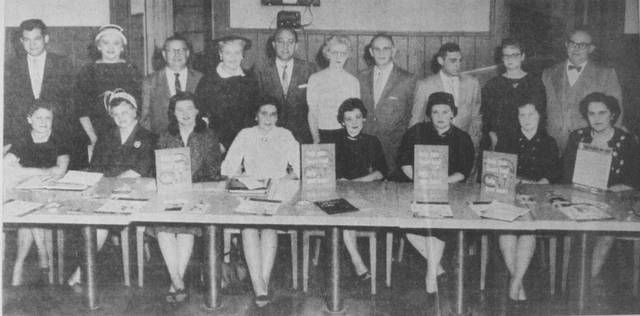1948 – 71 YEARS AGO
Despite the fact that the Pittston Publishing Company and the Sunday Dispatch operations were moved to the lower floor of the Kehoe Building at the corner of South Main and Dock Streets, the Dispatch was delivered on time Sunday morning. Although the issue was “not up to the usual standards as far as news content,” the move was necessary to gain more space. Publisher William Watson promised future publications of the paper would hold much more content and be a much larger size due to installation of a modern press. The staff thanked their subscribers for their loyal support and promised to strive to maintain a “truthful news policy and keep the public properly informed.” The Sunday Dispatch is currently in its 72nd year of publication.
1949 – 70 YEARS AGO
The Dispatch came into temporary possession of a Pittston area directory dated 1890 and decided to publish some of the contents. The directory had 390 pages full of information and was published in Pittston by P.T. Robinson. The directory listed the population of Greater Pittston as 26,500. Many family surnames listed included Coolican, Donnellan, Donahue, Fortney, McNulty, McMurtrie and McLaughlin. Mrs. R. H. Green was proprietress of the Butler House, 71 N. Main St. and advertised it as a place for “Temperance Boarding.” The Borough of Pittston had two daily newspapers and one weekly. John F. Collier and T.S. Loftus published the Pittston Daily Times. Michael Battle was listed as the circulation collector. Included among the carrier boys for the Pittston Times were William Gibbons, Thomas Mitchell, William Kearns, Leo Lavin, James Foster, Edward O’Boyle and Peter McAndrew. The Evening Gazette was another daily newspaper. Theodore Hart Jr. was the proprietor and the office was at 18 N. Main St. Paper boys were Leo Walsh, Thomas Garrity, William Searle, Harry Potter, David Daniels, Michael Gannon and Martin Lintern.
After a 20-year hiatus, Pittston High School resumed its baseball program. Art O’Malley looked to seek a berth for the team in a high school league and, if the bid was unsuccessful, the plan was to play independent ball. The Dispatch had hoped to find a list of the lineup of the previous Pittston High School baseball team but was unsuccessful. The championship team in the Pittston City Teeners’ League, the Pittston Eagles, had a number of Pittston High School students such as standout players Joe Ardoline, Tracey O’Haire, Malcolm Tracey, Nick Rizzo and Sam Capitano.
The Pittston Displaced Persons Bureau received 15 applications from people who wished to sponsor a displaced person coming from Europe to America. The federal government defrayed the expenses of the displaced persons from their port of embarkation in Europe to New York. Upon arriving in New York, the sponsor would defray the remaining traveling expenses and had to promise to care for the person so that he or she would not become a ward of the government. The Displaced Persons Act of 1948 was federal legislation designed to help resettle thousands of Europeans who had been displaced from their homes by World War II. The government had a quota set for the nationals. When World War II came to an end in 1945, an estimated 7 to 11 million displaced persons were still living in Germany, Italy, and Austria. President Harry S. Truman called upon Congress to enact legislation that would allow some of these wartime refugees to enter the United States. The law authorized the entry of 200,000 displaced persons over the next two years. When the act was extended for two more years in 1950, it increased displaced-person admissions to 415,000.
1960 – 59 YEARS AGO
Sgt. Frank Keder, of West Pittston, completed 20 years of service in the Air Force. Keder, an Air Force recruiting supervisor, enlisted in the Regular Army Air Corp. He served in Italy with the 15th Air Force as a B24 navigator. In April 1944 while on a raid, he and his crew were shot down over Budapest, Hungary. Keder parachuted out of the plane and was taken prisoner and held in Germany until May 1945. After returning to the U.S., Keder was assigned Texas, Illinois and Colorado and was then assigned back to Germany. He returned from there in 1947. He re-enlisted after a 20-day separation from service as a Master Sergeant.
The Spirit of Gettysburg, a 252-page book written by Nicholas A Meligakes was the subject of discussion locally due to the Centennial Commemoration of the Civil War. Meigakes was married to the former Sophia Sfarnas, of Exeter Avenue in the borough. The Sfarnas family owned and operated the Sweetland, a business located in Pittston for over 30 years. The book was lauded by Paul L. Roy, editor of the Gettysburg Times, for “the tireless efforts on the part of Mr. Meligakas in delving into the history of this phase of the War Between the States.”
In an article published in the Sunday Dispatch entitled “In This, Men First,” It was reported that the United States Postal Department planned to hire more women as mail clerks in post offices across the country. It stated that, for many years, there had been a “woman clerk” in the Pittston office. The article went on to state “men should be hired first before considering a woman for a position.” The article cited the fact that the Wyoming Valley had been listed as a “distressed area” because the region lacked employment possibilities for “male breadwinners.” It was reported that government figures showed Greater Pittston as having the highest percentage of unemployed men in the nation, and the new directive permitted competition for the men in one of the few possible places where “male help could be hired exclusively.” According to the Smithsonian National Postal Museum, women were hired in the postal service in the 1700s, but through the years, women complained they were under terrific scrutiny by their male counterparts. It was reported in the 1902 New York Times, “every time a woman is appointed to a clerkship in one of the departments, she lessens the chances of marriage for herself and deprives some worthy man the chance to take unto himself and raise a family.” By the 60s and 70s, opportunities for women in the workforce grew in government jobs and in the private sector. They began to ask for equal work and equal pay. These requests were followed up by the Equal Pay Act in 1962 and the Equal Opportunities act of 1967.
1979 – 40 YEARS AGO
Members of the 166th Signal Photo Co., Third Army gathered for their 38th reunion in Dupont. The World War II photographers, many of whom served on the front lines during the war, traveled from all parts of the county. Local vets Deno Chiavacci, of Hughestown, and Joe Byank, of Dupont, attended and, along with their buddies, shared old stories and memories of the 116th and 165th photo companies that covered the history of the war while it was happening. Combat photographers snapped pictures for military use during the Normandy, Northern France, Rhineland, Ardennes and Central Europe campaigns serving under General George Patton.
1995 – 24 YEARS AGO
The City of Pittston was celebrating its 100th birthday. Pittston City was carved from Pittston Township in 1853 and became a city after a general election in which citizens approved of the change in 1894. Thomas Maloney then became the first mayor. An editorial in the Sunday Dispatch stated, “Most of us who live in Greater Pittston can trace our family roots back over the 100-year history of Pittston and very few of our lives and those of our ancestors have not been influenced by the events which make up Pittston’s history.”
THIS DAY IN HISTORY
1825 — Congress approves Indian Territory (present-day Oklahoma), clearing the way for forced relocation of the Eastern Indians on the “Trail of Tears.”
1862 — President Abraham Lincoln issues General War Order No. 1, setting in motion the Union armies.
1939 — President Franklin D. Roosevelt approves the sale of U.S. war planes to France.
1959 — NASA selects 110 candidates for the first U.S. space flight.
BORN ON THIS DAY
1756 — Wolfgang Amadeus Mozart, Austrian musical genius and composer; his works included “The Marriage of Figaro” and “The Magic Flute.”
1900 — Hyman Rickover, American admiral who is considered the “Father of the Atomic Submarine.”




